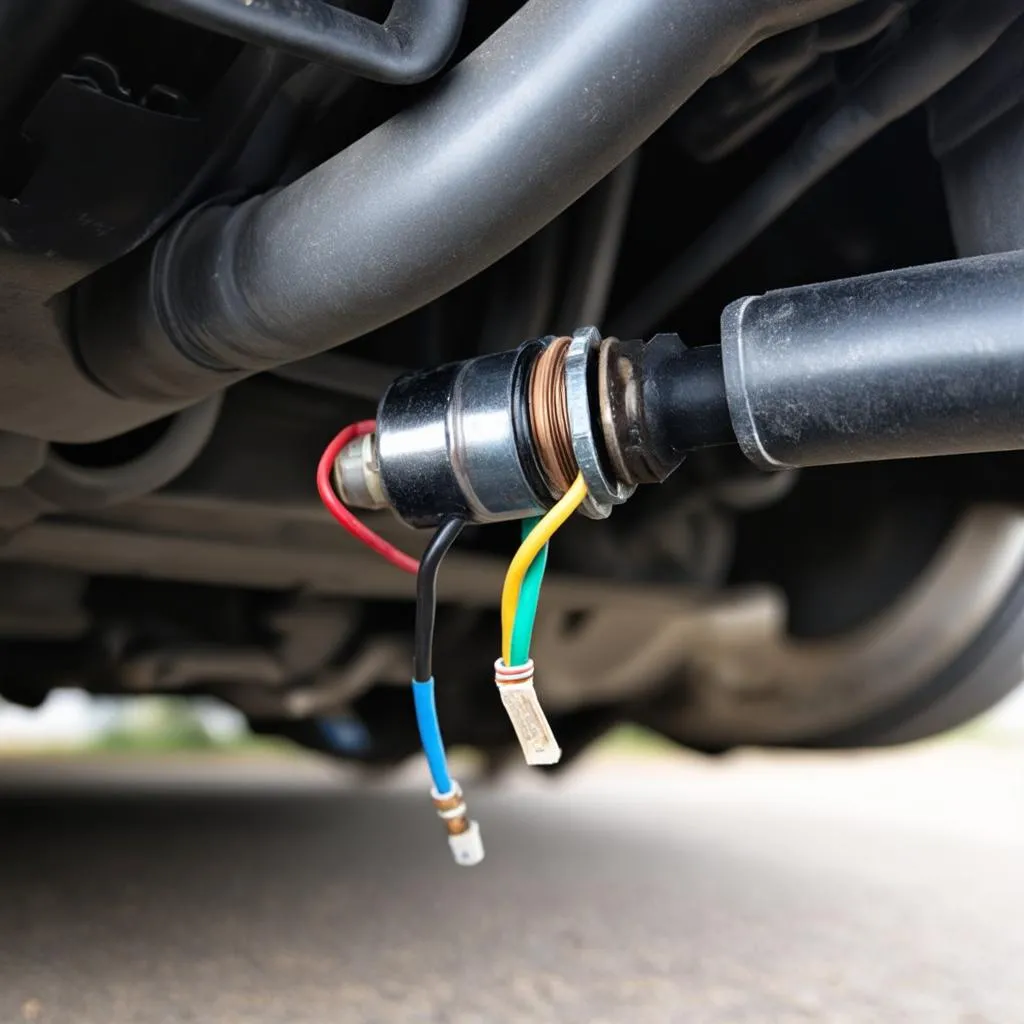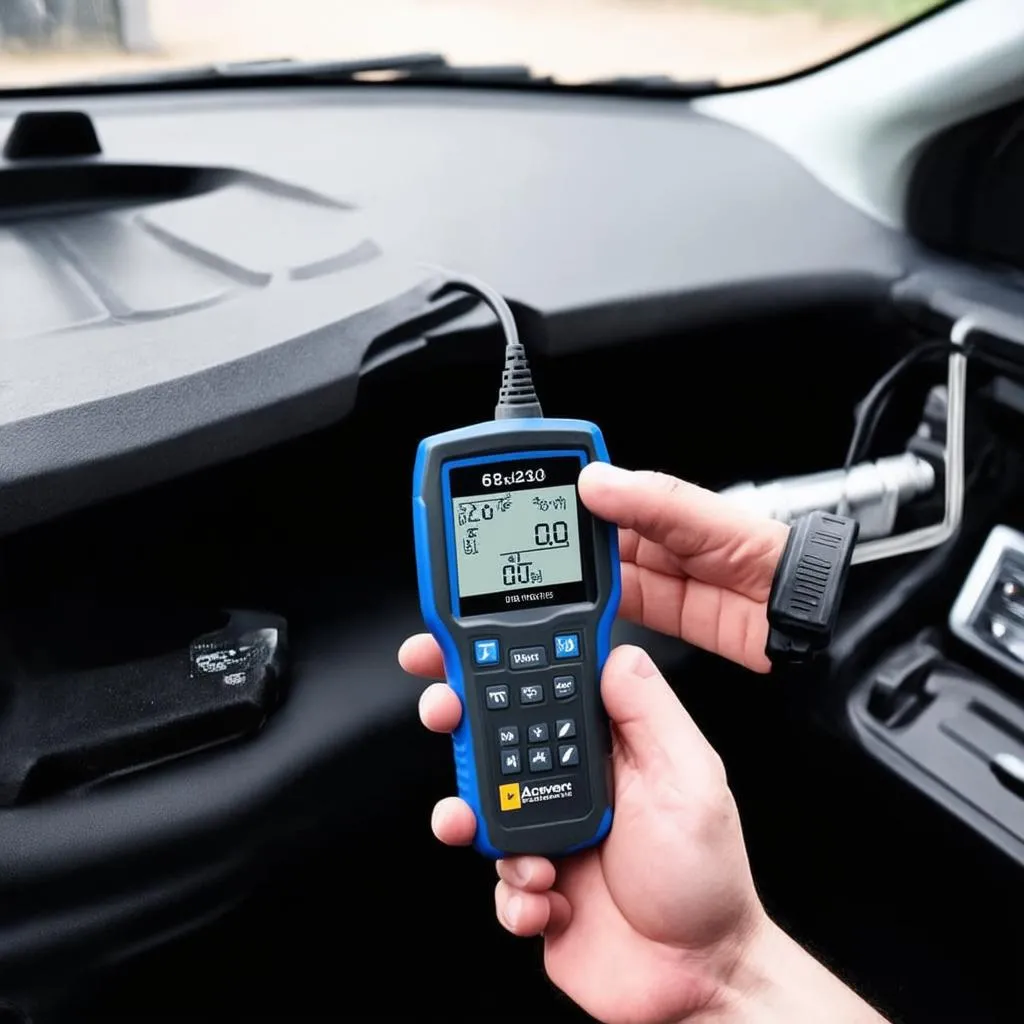Have you ever been driving your Dodge and suddenly the check engine light comes on? You pull over, check the engine, and everything seems fine. Then you notice the code P0137 pop up on your OBD scanner. You start to panic because you don’t know what it means.
Well, you’re not alone! Many Dodge owners experience this issue, but it can be fixed. In this article, we’ll discuss what P0137 means, how to troubleshoot it, and some tips for preventing it in the future.
What Does Dodge Obd Code P0137 Mean?
Dodge Obd Code P0137 indicates a problem with the oxygen sensor (O2 sensor) in the exhaust stream. The O2 sensor is a crucial component of your car’s emissions system. It monitors the amount of oxygen in the exhaust stream and sends data to the engine control unit (ECU). The ECU uses this information to adjust the air-fuel mixture to optimize engine performance and reduce emissions.
When the ECU detects a problem with the O2 sensor, it sets code P0137. This code typically indicates that the sensor is not working properly, sending the wrong signals to the ECU, or that there’s a problem with the electrical wiring of the sensor.
Why Does This Code Appear?
There are several reasons why your Dodge might throw the P0137 code.
1. Damaged or Faulty O2 Sensor
The most common reason is a damaged or faulty O2 sensor. The O2 sensor is exposed to harsh conditions in the exhaust system, such as high temperatures and corrosive gases. Over time, these conditions can cause the sensor to malfunction or fail altogether.
2. Electrical Issues
Sometimes, the problem might not be with the O2 sensor itself but with the wiring that connects it to the ECU. Corrosion, damage, or a loose connection can prevent the sensor from sending data correctly to the ECU.
3. Exhaust System Issues
Problems with the exhaust system, such as a leak or a clogged catalytic converter, can also affect the O2 sensor and trigger a P0137 code.
How to Troubleshoot Dodge Obd Code P0137
Here are a few steps you can take to troubleshoot the P0137 code:
- Inspect the O2 sensor: First, visually inspect the O2 sensor for any damage or signs of corrosion. If you find any damage, you’ll need to replace the sensor.
- Check the wiring: Next, check the wiring connecting the O2 sensor to the ECU. Look for any signs of damage, corrosion, or loose connections. If you find any problems, repair or replace the wiring.
- Check the exhaust system: Finally, inspect the exhaust system for any leaks or blockages. If you find any issues, repair them before attempting to fix the P0137 code.
Troubleshooting Tips
Here are a few tips to help you troubleshoot the P0137 code:
- Use a diagnostic tool: While a basic OBD scanner can help you diagnose the issue, using a more advanced diagnostic tool can give you more information about the specific problem.
- Use a multimeter: Using a multimeter can help you test the O2 sensor for proper function.
- Clear the code after repairs: After making any repairs, clear the code from the ECU and test drive the vehicle to see if the code returns.
What Happens If You Don’t Fix Dodge Obd Code P0137?
Ignoring the P0137 code can lead to several problems, including:
- Increased fuel consumption: The ECU will not be able to adjust the air-fuel mixture properly, leading to increased fuel consumption.
- Reduced engine performance: The engine may run poorly or experience misfires.
- Increased emissions: Your vehicle may fail emissions testing.
- Damaged catalytic converter: A faulty O2 sensor can cause damage to the catalytic converter.
Dodge Obd Code P0137: A Tale of Two O2 Sensors
One time, I was working on a Dodge Durango. The owner was complaining about poor gas mileage, a rough idle, and the check engine light constantly on. He had already replaced the O2 sensor, but the code P0137 kept returning.
After inspecting the exhaust system, I discovered a small leak in the exhaust manifold. The leak was causing the O2 sensor to read inaccurate data, which in turn triggered the P0137 code. I repaired the leak, cleared the code, and the Durango ran like new!
Dodge Obd Code P0137: A Feng Shui Perspective
Some believe that the oxygen sensor plays a role in the car’s energy flow. The O2 sensor’s function of regulating air and fuel flow, like Chi, the life force energy in Feng Shui, is essential for the car to function properly.
A malfunctioning O2 sensor, like a blockage in Chi, could disrupt the car’s energy flow and lead to problems.
Dodge Obd Code P0137: The Importance of Early Detection
It’s important to address the P0137 code promptly, as ignoring it could lead to more severe problems. If you notice any warning signs of a faulty O2 sensor, such as the check engine light coming on, reduced fuel economy, or a rough idle, don’t hesitate to have your vehicle inspected by a qualified mechanic.
Dodge Obd Code P0137: Common Questions
Q: Where is the O2 sensor located in my Dodge?
The location of the O2 sensor can vary depending on the model year and engine type, but it’s typically located in the exhaust manifold or the exhaust pipe. You can consult your owner’s manual or a reputable online resource to find the specific location of the O2 sensor for your Dodge.
Q: How much does it cost to replace an O2 sensor?
The cost of replacing an O2 sensor can vary depending on the make and model of your Dodge, as well as the location of the sensor. You can expect to pay anywhere from $100 to $300 for the sensor itself, plus labor costs.
Q: Can I replace the O2 sensor myself?
Replacing the O2 sensor yourself is possible, but it’s a job that’s best left to a qualified mechanic. Replacing the sensor requires specialized tools and knowledge of your Dodge’s electrical system.
Q: What are some other OBD codes related to the O2 sensor?
Other OBD codes related to the O2 sensor include P0136, P0138, P0139, and P0140.
Dodge Obd Code P0137: Related Products
- Dealer Scanner for European Cars: This scanner is specifically designed for European cars and can help you diagnose and troubleshoot a wide range of issues, including P0137.
- OBD2 Scanner: This basic scanner can be used to read and clear diagnostic codes on most vehicles.
- O2 Sensor: If your O2 sensor is faulty, you’ll need to replace it with a new one.
Dodge Obd Code P0137: Supported Vehicles
This code can affect a wide range of Dodge vehicles, including:
- Dodge Charger
- Dodge Challenger
- Dodge Durango
- Dodge Grand Caravan
- Dodge Journey
- Dodge Ram
Dodge Obd Code P0137: Next Steps
If you’re experiencing the P0137 code, don’t hesitate to contact us. We can help you diagnose the problem and get your Dodge back on the road!
Contact Us:
- WhatsApp: +84767531508
We offer 24/7 support for all your Dodge OBD code needs.
Learn More:
- Check out our other articles on Dodge OBD codes and diagnostics tools.
- Visit our website to learn more about our services and products.
Get in touch with us and let us help you get back on the road!
 Oxygen Sensor
Oxygen Sensor
 OBD Scanner
OBD Scanner
 Dodge Charger
Dodge Charger